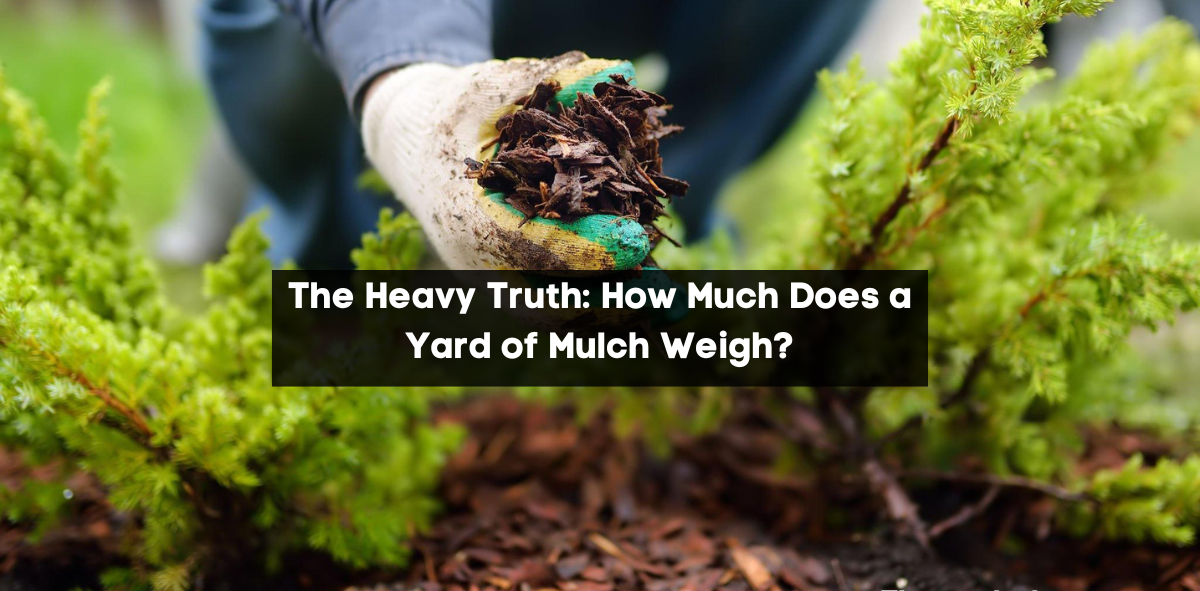Mulch is a material used to cover and protect the soil in gardens, flowerbeds, and landscaping.
It has many benefits, including retaining moisture in the soil, suppressing weed growth, regulating soil temperature, and providing nutrients as it decomposes over time.
Mulch can be made from various materials, such as wood chips, bark, leaves, grass clippings, or straw.
Benefits of Mulching
Mulching is an essential practice in gardening and landscaping. It not only benefits plants but also helps to improve the overall appearance of your landscape.
Applying mulch helps retain moisture in the soil, which reduces water loss through evaporation.
It also helps to suppress weed growth by blocking sunlight from reaching weed seeds that may be present in the soil.
How Much Does a Yard of Mulch Weigh?
Before we can answer this question accurately, we need to understand what a yard of mulch is and how it’s measured. A yard is a unit of measurement that equals 27 cubic feet or approximately 202 gallons.
When you purchase mulch from a supplier or retailer, they sell it by cubic yard.
The Weight of one yard of mulch can vary significantly depending on several factors, such as moisture content, the type of wood used for the mulch, and its fineness or coarseness.
So just how much does a yard of mulch weigh? Stay tuned as we dive deeper into this question!
Weight of a Yard of Different Mulch: The Truth Revealed!
Are you curious about how much a yard of mulch actually weighs? Prepare to uncover the truth as we delve into the factors that influence mulch weight, including its type and moisture content.
| Mulch Type | Weight (per yard) |
|---|---|
| Wood Chips | 400-800 lbs |
| Bark Mulch | 400-600 lbs |
| Cedar Mulch | 400-600 lbs |
| Pine Straw | 250-400 lbs |
| Rubber Mulch | 600-800 lbs |

Basics of Mulch Weight
Mulch is a layer of material, such as wood chips or straw, spread over soil to protect plants and retain moisture.
A yard of mulch refers to the volume of mulch that would cover an area of 3 feet by 3 feet by 3 feet. This is equivalent to 27 cubic feet.
Different Types of Mulch and Their Weight Variations
Various mulches are available, and each style has its weight variation. For example, cedar bark mulch weighs less than pine straw mulch due to its coarser texture. Hardwood bark mulch falls in between these two in terms of Weight.
The Weight also varies based on the moisture content; wet mulches weigh more than dry ones. It’s essential to consider the Weight when purchasing your desired type of mulch for your garden or landscape projects.
Knowing how much a yard weighs will provide insight into how much you can transport without overloading your vehicle or straining yourself. In the next section, I’ll delve deeper into factors affecting the Weight of a yard of mulch.
Factors Affecting Mulch Weight
Mulch weight can vary based on a few different factors.
Understanding these factors is essential for determining how much you’ll need and how much it will cost. The three main factors that affect mulch weight are:
- Moisture content.
- The type of wood used.
- The fineness or coarseness of the mulch.
Moisture Content
Moisture content is one of the most significant factors affecting mulch weight.
Freshly made mulch contains a lot of water, which adds significant weight to each bag or cubic yard. As the mulch dries out, it gets lighter.
That’s why paying attention to whether your supplier sells their bags by Weight or volume is essential.
If they sell by volume but need to consider moisture content, you may be getting less actual mulch than you’re paying for.
Type of Wood
The type of wood used in making the mulch can also impact its Weight. Some types of wood are denser than others and will therefore be heavier in equal volumes.
For example, cedar is generally lighter than hardwoods like oak or maple. Pine tends to be somewhere in between those two categories.
Fineness or Coarseness of Mulch
Mulches can come in different textures — fine or coarse — which can impact their density and, therefore, their overall Weight per cubic yard.
Fine layers pack together more tightly than more granulated materials, so they tend to weigh more per cubic yard even if they have similar moisture content and use similar types of wood.

Calculating Mulch Weight
Mulch weight can vary depending on the moisture level and type of wood. To accurately determine how much a yard of mulch weighs, you need to know the density and moisture content.
The formula for calculating mulch weight based on these factors is as follows:
Mulch Weight = Volume (in cubic feet) x Density (in pounds per cubic foot) x Moisture Content (%)
The volume can be determined by measuring the length, width, and height of the area where you will apply the mulch and multiply those dimensions.
The density varies depending on the type of wood used for the mulch. Pine bark, for example, is less dense than hardwood.
Moisture content is a critical factor in determining how much mulch weighs. Wet or freshly cut wood will consider more than dry wood because it contains water.
Standard Weights for Different Types of Mulch
Now that we know the basics about mulch weight let’s take a look at some legal consequences for popular types of mulches:
Cedar Mulch
Cedar mulch is popular due to its natural insect-repelling properties and pleasant smell. It weighs between 400-800 pounds per yard, depending on its moisture content and fineness.
Pine Mulch
Pine mulch is one of the most affordable and readily available options. It typically weighs between 300-600 pounds per yard but can be even lighter if it’s more coarsely shredded.
Hardwood Mulch
Hardwood mulch is a durable option that lasts longer than others. Its Weight varies based on the type of hardwood used, but it generally falls between 500-900 pounds per yard.
Rubber Mulch
Rubber mulch is becoming increasingly popular due to its long-lasting properties and eco-friendliness. It weighs around 150-200 pounds per yard due to its light and bouncy nature.
Stone or Gravel Mulch
Inorganic options like stone or gravel mulches are often used in landscaping because they provide good drainage. They don’t decompose like organic materials, so they also last longer.
The Weight depends on the size of the stones being used since smaller rocks are denser; smaller stones may weigh up to 3000 pounds per cubic yard, while larger ones weigh less than half that amount.

Tips for Handling Heavy Mulch Bags
Lift with Your Legs, Not Your Back
When lifting and moving heavy bags of mulch, the most important thing to remember is that you should always lift with your legs and not your back.
This means bending your knees and using the strength in your lower body to lift the bag instead of bending over from the waist and putting pressure on your spine.
It’s also a good idea to keep the load as close to your body as possible when lifting it to minimize strain.
Team Lift If Possible
If the bags of mulch are especially heavy or awkwardly shaped, enlisting help from a friend or family member may be a good idea.
Working together can make the job easier and safer for both people involved.
Be sure to clearly communicate how you plan to lift the bags before moving them.
Use a Wheelbarrow or Garden Cart
Another option for moving heavy bags of mulch is using a wheelbarrow or garden cart.
These tools can help distribute weight evenly while making transporting multiple bags at once more accessible.
Ensure the wheelbarrow or cart is sturdy enough for the Weight you’re carrying, and don’t overload it.
Take Breaks When Needed
Moving heavy bags of mulch can be tiring, so take breaks when needed.
Hydrate throughout your activity because these organic materials can sap up moisture quickly on hot summer days. So if you feel fatigued due to dehydration, keep yourself hydrated.
It’s important not to overdo it or push yourself too hard, as this can lead to injuries like sprains and strains.
Finally, always wear protective gloves to avoid blisters and minor cuts while moving the bags of mulch.
Conclusion
The Weight of a yard of mulch depends on various factors, including its moisture content, type of wood, and fineness or coarseness.
Cedar mulch generally weighs less than pine or hardwood mulches, while wet mulch can weigh significantly more than dry mulch.
It’s essential to calculate the Weight of the mulch you need before purchasing to ensure you have enough and can handle it.

